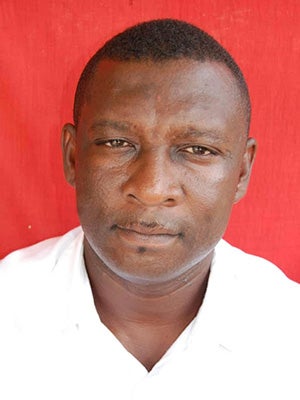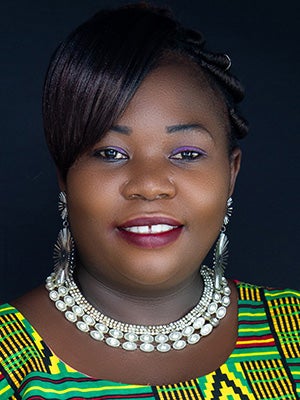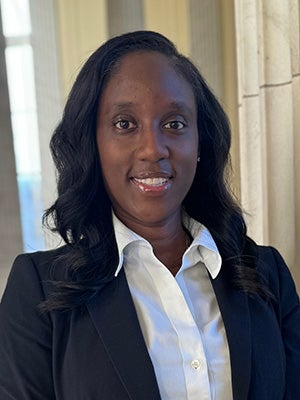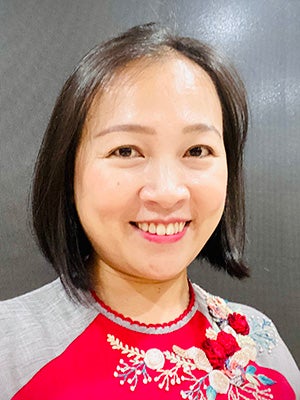May 16, 2024—One small cohort at a time, graduates of the Harvard Global Nursing Leadership Program (HGNLP) are beginning to move the needle on improving health systems in their countries.
“We want to see our graduates reforming policies and legislation to move us closer to achieving global health mandates,” said Stephanie Ferguson, professor of the practice of health policy and management at Harvard T.H. Chan School of Public Health and director of HGNLP, a certificate program that will welcome its third cohort this fall.
The world requires better health systems management, and a robust nursing and midwifery workforce is critical, said Ferguson. Placing nursing leaders in positions of power where they can influence regional, national, and international policies can help countries make advances in areas such as global health security, universal health coverage, and the United Nations Sustainable Development Goals.
That’s why she is pleased the incoming cohort of students will again include nurses with a focus on making bolder, broader impact. It will also be more global, as the program, which originally only accepted students from Africa, now accepts them from everywhere.
“We’ve opened the program up globally because the world is facing challenges, including in our own country,” said Ferguson. Here in the United States, the National Council of State Boards of Nursing reports that 100,000 nurses left the workforce during the COVID-19 pandemic. By 2027, almost 900,000 nurses plan to retire. That’s nearly one-fifth of the nation’s 4.5 million registered nurses, said Ferguson.
“We need nursing leaders to help change the legislative rules, the laws, and the regulatory processes to make sure we have the right policies in place to address this looming shortage.”
Increasing the influence of nurses
HGNLP is an innovative public health program that focuses on expanding the role of nurses in shaping global health. It combines leadership education and in-field training with networking and international collaboration to enable nurses to secure more influential leadership roles within the health systems in their home countries.
“Our graduates have accomplished a tremendous amount,” said Ferguson. She noted that some of the participants head nursing schools and have since transformed curricula and created initiatives to enhance the supply of nurses and midwives in their countries.
Ferguson said that graduates have used their certificate to gain entry into global health research degree programs and to secure promotions in their workplaces. The certificate has also enabled them to join organizations that focus on population health, including bilateral organizations such as the World Health Organization and the World Bank.
Making a public health impact
Graduates from the past two cohorts spoke of how they learned to step back and recognize how health systems work, identify gaps in their own systems, and work with public and private leaders and stakeholders to form solutions.
Chancy Banda, who serves as district nursing and midwifery officer for a local government and rural development ministry in Malawi, is developing an awareness campaign to address a sharp uptick in diabetes, which is worsening the nation’s strained health system.
“I learned to analyze a health system and apply that to the context in Malawi. Then I assessed the capacity we have as a district, mapped out stakeholders and potential partners, and went through all the steps to make clear the problem with precise communications,” said Banda, whose three-tier approach to reduce diabetes will include messaging via radio and texts.

Benjamin Yamusah, chief nursing officer of the Chereponi Government Hospital in Ghana, said HGNLP helped him develop a heightened sense of advocacy.
“We learned we must make our own plans to address gaps in our health systems,” said Yamusah, who successfully brought his project plan through layers of government in Ghana and developed a highly collaborative and community-informed project that reassigned urban midwives to rural regions of Ghana to address high maternal death rates. “We developed crucial knowledge about how to interact with people in higher authority—how to impart our message in a way that is both brief and clear,” he said.

“The HGNLP was life-changing because it taught us to view the world from a different perspective and handle global health challenges in our own local context and then develop tailored solutions,” said Getrude Mwambui, a senior nursing officer in Kenya.
A ‘stronger voice for nurses’
Orientation for the program’s new cohort of 10 students kicks off in August 2024. Lindsey Harris, a family nurse practitioner, assistant professor at the University of Alabama at Birmingham, and legislative fellow in the office of Rep. Lauren Underwood of Illinois, is one of three U.S. students. She is eager to begin.

“I am going to focus on maternal mortality—with increasing maternal mortality rates in the country, I am very concerned about women’s access to safe reproductive health care,” said Harris. “I want a global perspective around what is and is not working in this space and how we can improve.”
The next cohort also includes nursing leaders from Belize, Liberia, the Philippines, Tanzania, and Vietnam, including Tran Thuy Khan Linh, leader of the nursing faculty at the University of Medicine and Pharmacy in Ho Chi Minh City, where she has made many academic and research-based improvements for nurses and forged links with international organizations. She is a strong advocate for nursing research led by nurses—a major change for Vietnam, where most research is led by medical doctors.

“I am excited to have an opportunity to network with nursing leaders from other countries and learn how they overcome challenges in global health,” she said. “I plan to become an even stronger voice for nurses so that government policymakers invest more in nursing education and create a much better and healthier environment for nurses.”
Photos courtesy Chancy Banda, Benjamin Yamusah, Getrude Mwambu, Lindsey Harris, Tran Thuy Khan Linh
